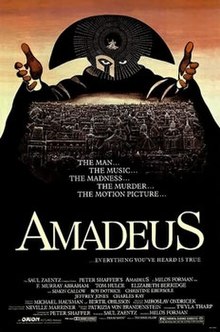Our website is made possible by displaying online advertisements to our visitors.
Please consider supporting us by disabling your ad blocker.
Amadeus (film)
| Amadeus | |
|---|---|
 Theatrical release poster by Peter Sís | |
| Directed by | Miloš Forman |
| Screenplay by | Peter Shaffer |
| Based on |
|
| Produced by | Saul Zaentz |
| Starring | |
| Cinematography | Miroslav Ondříček |
| Edited by | |
Production company | |
| Distributed by |
|
Release dates |
|
Running time | 161 minutes[1] |
| Country | United States |
| Language | English |
| Budget | $18 million[2] |
| Box office | $90 million[3] |
Amadeus is a 1984 American period biographical drama film directed by Miloš Forman and adapted by Peter Shaffer from his 1979 stage play of the same name, starring F. Murray Abraham and Tom Hulce. Described by Shaffer as a "fantasia on [a real-life] theme", and originally inspired by Alexander Pushkin's 1830 play Mozart and Salieri, the film imagines a bitter rivalry between two of Vienna's most eminent composers of the 18th century: the supremely gifted Wolfgang Amadeus Mozart (Hulce) and the politically connected Antonio Salieri (Abraham). Over the course of the film, Salieri struggles to reconcile his professional admiration of Mozart with his personal hatred for the man, and resolves to ruin Mozart's career to avenge himself against God.
Amadeus was released by Orion Pictures on September 19, 1984, thirteen days after its world premiere in Los Angeles on September 6, 1984. Upon release, it received widespread acclaim and was a box office hit, grossing over $90 million. Amadeus was nominated for 53 awards and received 40, including eight Academy Awards (including Best Picture and Best Director), four BAFTA Awards, four Golden Globe Awards (including Best Motion Picture – Drama and Best Director), and a Directors Guild of America Award for Outstanding Directing – Feature Film. Abraham and Hulce were both nominated for the Academy Award for Best Actor, with Abraham winning. As of 2024[update], Amadeus was the most recent film to receive multiple Best Actor nominations. In 1998, the American Film Institute ranked it 53rd on its 100 Years... 100 Movies list. In 2019, the film was selected for preservation in the United States National Film Registry by the Library of Congress as being "culturally, historically, or aesthetically significant".[4][5][6]
- ^ a b "Amadeus". British Board of Film Classification. Archived from the original on September 21, 2020. Retrieved May 13, 2014.
- ^ "Amadeus (1984) – Financial Information". The Numbers. Archived from the original on February 12, 2018. Retrieved December 22, 2014.
- ^ Cite error: The named reference
wwwas invoked but never defined (see the help page). - ^ Tartaglione, Nancy (December 11, 2019). "National Film Registry Adds 'Purple Rain', 'Clerks', 'Gaslight' & More; 'Boys Don't Cry' One Of Record 7 Pics From Female Helmers". Deadline Hollywood. Archived from the original on February 25, 2021. Retrieved December 11, 2019.
- ^ "Women Rule 2019 National Film Registry". Library of Congress. Archived from the original on December 11, 2019. Retrieved September 14, 2020.
- ^ "Complete National Film Registry Listing". Library of Congress. Archived from the original on May 7, 2016. Retrieved September 14, 2020.
Previous Page Next Page


